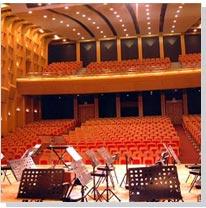 In June of 2006 there was a concert at Beijing’s Central Conservatory of Music devoted to new works by young Tibetan composers. Four of them were students while the fifth was their teacher from Lhasa, Professor Jorgar. This multi-year program was his dream – a way of taking a promising generation of composers from Tibet and training them in the music of both the Western and Eastern traditions at the highest levels China could offer. Replanted back home some of them would surely teach, and a home-grown Tibetan school of composers might then be born into existence.
In June of 2006 there was a concert at Beijing’s Central Conservatory of Music devoted to new works by young Tibetan composers. Four of them were students while the fifth was their teacher from Lhasa, Professor Jorgar. This multi-year program was his dream – a way of taking a promising generation of composers from Tibet and training them in the music of both the Western and Eastern traditions at the highest levels China could offer. Replanted back home some of them would surely teach, and a home-grown Tibetan school of composers might then be born into existence.
I heard about this Beijing concert at a special program which was part of a National Endowment for the Humanities Summer Institute devoted to studying Buddhist Traditions of Tibet and the Himalayas. Last Thursday night an evening of Tibetan and Chinese composers was presented by Dr. Ning Tien at College of the Holy Cross, and I was among those attending. Like anyone else there I didn’t know what to expect, and the music didn’t disappoint. It featured a recording of the concert given in Beijing as well as a “live” part of the program with a string quartet and a pianist.
The evening began with a recorded performance of Circle of Life by Mingyur Tendzin. A work which tracks the life cycle according to Buddhist thought: Life, Death, Bardo and Rebirth, it featured an ensemble of orchestral instruments, a chorus singing in Chinese and a tenor singing in Tibetan. The music was largely set in pentatonic mode with layers of ostinati – over which the vocalists offered folk-derived music that could have formed a sound-track to the film Lost Horizon. Although the work was largely set in predictable phrase lengths and expected rhythmic patterns, the closing Reincarnation music was truly glorious – almost surprisingly so, considering the fact that the soul was re-entering the world of samsara!
The remainder of the program was equally interesting but there was one composer who stood head and shoulders above the rest. His work was surprising in a number of ways. Most of the night’s music featurerd harmonies from a world nestled between Debussy and Turandot. But here was a composer using birdcalls, medieval drones, tone-clusters and truly atmospheric uses of percussion – from enormous drums to the most delicate of bells – to evoke a Tibetan soundscape with a ring of truth in every note. The work, called Yalone, was at once both modern and ancient. It had coloristic moments that could have come from Joseph Schwantner’s music juxtaposed against passages featuring an evocative, pitch-bending bamboo flute over a single, held note reflecting a scene of post-meditative calm. More than fifteen minutes long, it held the listener’s interest from beginning to end. This was the music of a young master. His name is Penpa Dawa.
After the program ended I spoke with Ning Tien, asking her about details of the music and perhaps more importantly, what had happen to these composers since the concert took place. “They’re back in Lhasa now,” she said – adding that she should would soon be in contact with her parents, both on the faculty of the Conservatory, to learn about what kind of artistic work they were involved in. “But is there an infra-structure in Tibet to support such creativity?” I asked. “Perhaps they will teach, write music for smaller ensembles, and maybe for film as well,” she answered. “They’ll have to be creative to make a living.”
I didn’t miss the irony that such an answer could be said of any young composer – even one from the Land of Snows.

WoW! I think you are an amazing conductor and I love reading your blog posts. Such a gifted musician and you find the most interesting topics! When will you post videos of your performances?